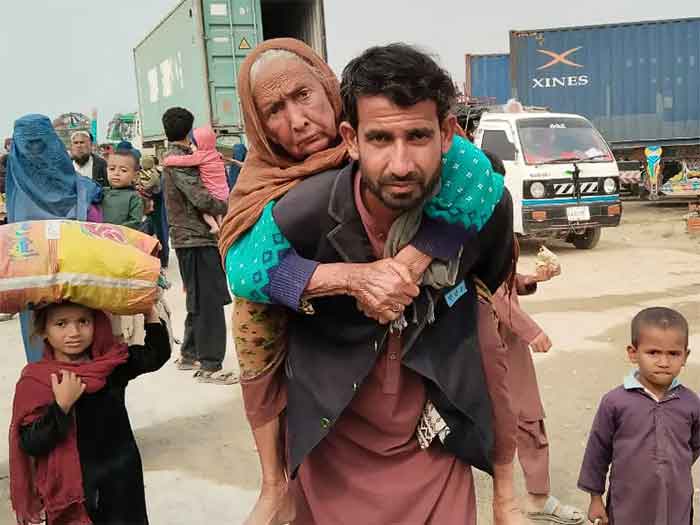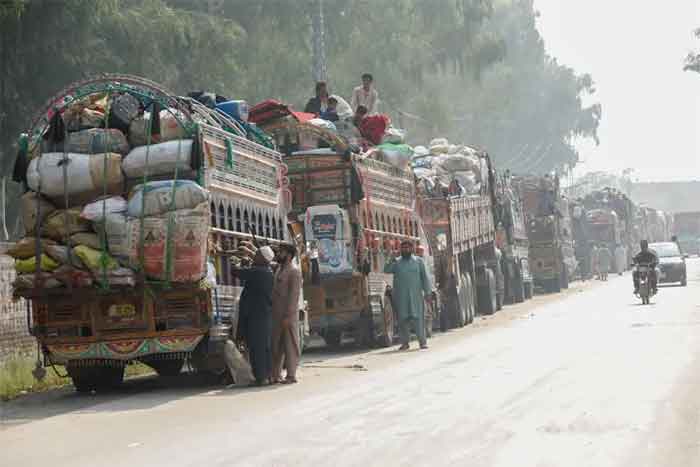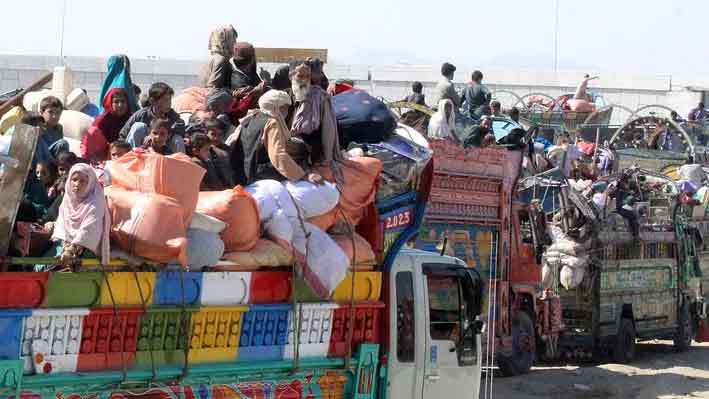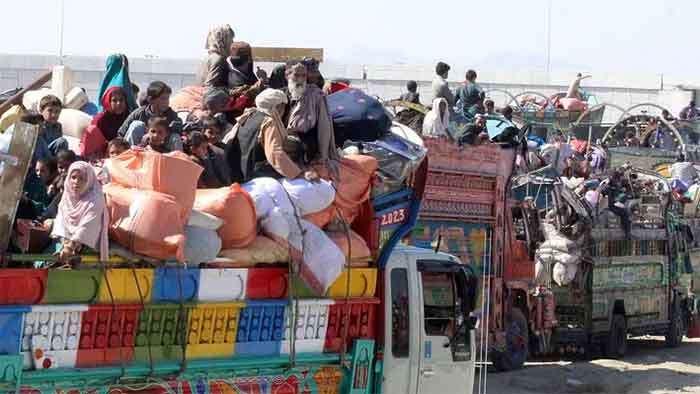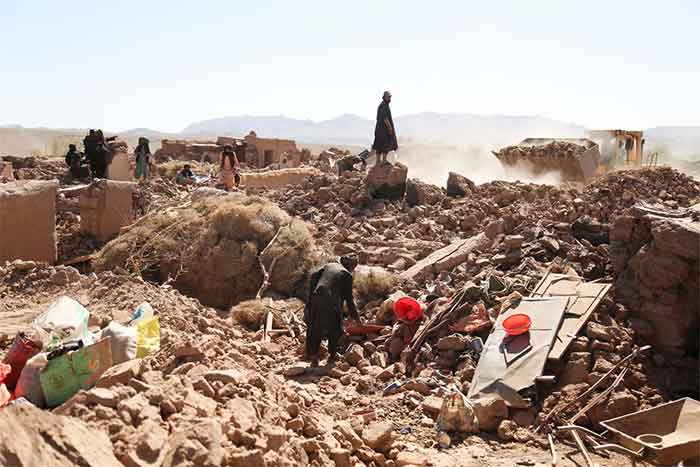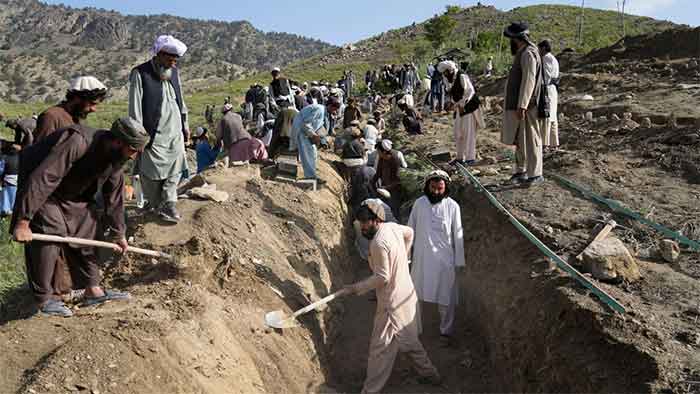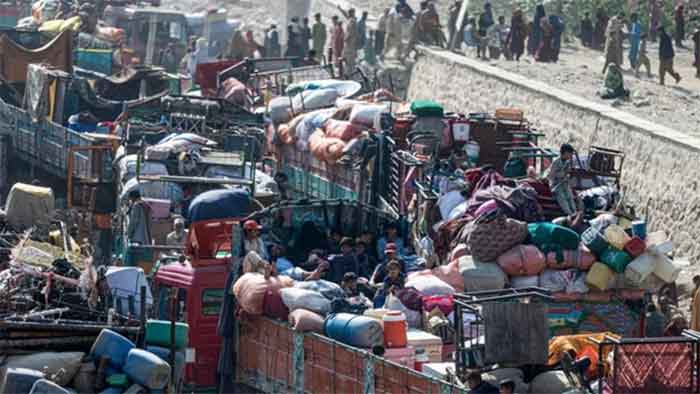
Hundreds of thousands of Afghans living in Pakistan faced detention and deportation on Wednesday, as a government deadline for them to leave sparked a mass exodus.
Islamabad has given 1.7 million Afghans it says are living illegally in the country until November 1 to leave voluntarily or be forcibly removed.
Thousands of families arrived voluntarily on Wednesday at a holding centre in Landi Kotal near the Torkham border, in Khyber Pakhtunkhwa province, where the majority of Afghan migrants live.
In other cities, police vans with detained Afghans were seen arriving at urban holding centers.
Pakistan has started to arrest Afghans as the country begins a nationwide crackdown on foreign nationals it says are in the country illegally.
Authorities have also targeted houses and businesses they deem illegal and Pakistanis accused of sheltering undocumented Afghans.
Close to 200,000 Afghans have returned home as of Monday, Pakistan said. Reports said 20,000 journeyed to the border on Tuesday as time to leave ran out.
Media reports said:
Thousands joined a snaking queue that stretched seven kilometres (four miles) at the busiest border point, with officials reporting at least 29,000 people crossed into Afghanistan the day before.
“Since November 1, the process of arrest and subsequent deportation of illegal foreigners has begun. However, the voluntary return of illegal foreigners will also continue and be encouraged,” the interior ministry said in a statement.
It said more than 140,000 people have left Pakistan since the start of October when the order was issued by an unelected caretaker government ahead of elections due in January.
Forty-nine holding centers, some capable of holding several thousand people, opened across the country on Wednesday to process and deport Afghans, state media said.
“My heart does not really want to return to Afghanistan but I have no other choice,” said 32-year-old Irfanullah, as he waited to be deported.
“The police were harassing me. They used to disrespect all the men and women by entering our houses. That is why we are returning, to avoid further humiliation.”
Millions of Afghans have poured into Pakistan in recent decades, fleeing a series of violent conflicts, including an estimated 600,000 since the Taliban government seized power in August 2021 and imposed its harsh interpretation of Islamic law.
Pakistan has said the deportations are to protect its “welfare and security” after a sharp rise in attacks, which the government blames on militants operating from Afghanistan.
Emergency Situation
The U.S. called on Pakistan to let through Afghans who are seeking asylum.
“We strongly encourage Afghanistan’s neighbors including Pakistan to allow entry for Afghans seeking international protection and to coordinate with international humanitarian organizations to provide humanitarian assistance,” State Department spokesman Matthew Miller said.
Authorities on the Afghan side of the border have been overwhelmed by the scale of the exodus as they attempt to process those returning — some of whom are setting foot in Afghanistan for the first time in their lives.
Samiullah Samoon, who leads immigration registration at Torkham, said the crossing is facing “an emergency situation”.
After fleeing to Afghanistan, 35-year-old Benafsha, four months pregnant with her seventh child, was waiting to be processed before moving on to her province of origin, Kunduz, with her family.
“In Kunduz, we do not have land, or a home, or work,” said the woman, who was never documented in Pakistan despite living there almost all her life.
“We do not have anything there.”
The Taliban government has urged Pakistan to give undocumented Afghans in the country more time to leave as pressure mounts at border posts.
Enough Is Enough
Lawyers and rights groups have accused the Pakistani government of using threats, abuse, and detention to coerce Afghan asylum seekers to leave while Afghans have reported weeks of arbitrary arrests and extortion.
“The constitution of Pakistan gives every person who is present on this soil right to a fair trial, but these refugees have been denied that right,” said Moniza Kakar, a Karachi-based human rights lawyer.
The expulsion of undocumented Afghans has widespread support from Pakistanis, analysts say, with a protracted refugee presence putting a heavy burden on the country’s infrastructure.
“Enough is enough, tell us the route and we will arrange a vehicle and leave today. This humiliation is too much,” said 35-year-old Baaz Muhammad, who was born in Pakistan to refugee parents, as he watched a bulldozer raze his home.
In Balochistan, the government said it was going door-to-door to trace undocumented Afghans who had refused to leave before the deadline.
A 14-year-old Afghan girl, whom AFP has not identified for security reasons, said she would stay in Pakistan as long as possible, despite not having legal papers.
“We are not going back home, because my education in Afghanistan would come to a grinding halt,” she told AFP in Peshawar.
“Our father has told us that if he is arrested by Pakistani authorities, we should not leave even then. Because we will have no life in Afghanistan.”
They Have Nothing
A BBC report said:
Thousands of Afghans in Pakistan have made their way back to Afghanistan in the last two months. But many of them, who have called Pakistan home for decades, say they have nothing to go back to, while others say they are terrified to be heading back to the Taliban government.
You know you are getting closer to the border when the stream of trucks thickens. Faces old and young watch the road, sitting atop piles of furniture, firewood, cookers and air conditioning units that judder precariously as the vehicles weave through traffic on their way to Afghanistan.
Abdullah, in Punjab province, has hired a truck to bring all 22 of his family members out of the country – 20 of them were born in Pakistan, he says.
“I initially came here when the Russian war started, I used to work in a brick kiln as a labourer. There are fewer job opportunities in Afghanistan,” he tells the BBC.
“I am very sad about leaving my house. I cannot express in words the pain I felt leaving it. Our house was made of mud, and we built it ourselves. I planted many trees there. My neighbors and friends were in tears [when I left] – It is the cruel government that is making us leave.”
In the last two months around 200,000 Afghan nationals have already left Pakistan ahead of the 1 November deadline, according to the Pakistan government. The recent daily returnee figures are three times higher than normal, says the Taliban refugee ministry spokesman Abdul Mutaleb Haqqani.
The government says the first wave of deportations will target those without any documentation – adding that the policy is only aimed at those that are in the country illegally. UNHCR, the United Nations refugee agency, has also reassured that the government will not take action against those with refugee cards.
But Abdullah says he has been targeted despite having an Afghan Citizen Card, an ID issued by the Pakistan government. He brandishes a plastic wallet and shows the cards for his entire family. According to the government’s own website, this counts as an official document.
He says that despite this, the police raided his house and arrested his sons. The BBC could not independently verify this.
“The government says to go back, even though we have these cards. This level of problem has never happened in the past,” Abdullah tells us.
On the truck, sitting on top of tarpaulin bags of belongings are Abdullah’s children, grandchildren and his wife. She didn’t tell us her name, but cannot stop crying.
“We have nothing,” she says in tears. “We did not do anything wrong; we used to work as labor and feed the family.”
A Much Criticized Policy
The BBC report said:
Pakistan is home to over four million Afghan migrants and refugees, about 1.7 million of whom are undocumented, according to authorities. As Afghanistan’s neighbor, Pakistan has seen people travel across the border for safety for four decades, from the 1979 Soviet invasion through to the more recent return of the Taliban in 2021.
The UNHCR has issued slips to those that have approached them for help, in hopes the government will acknowledge them. Some we meet show us their printed slips hopefully, but for now these are not officially recognized by Pakistani authorities.
Despite the criticism, Pakistan’s government has forged ahead. Last week its interior minister announced plans to open centers around the country to help process detainees before deportation, saying that the elderly, children and women would be treated with extra care.
When challenged, the government has pointed out that it is within its rights to follow its own laws. Furthermore its “record of the last forty years in hosting millions of our Afghan brothers and sisters speaks for itself”, according to a foreign ministry spokeswoman.
The Taliban government has urged Pakistan to rethink its “unacceptable” move. The Afghan Ministry of Refugees intends to register returnees and house them in temporary camps, while the Taliban administration will try and find returnees jobs.
But there are worries about how thousands of deportees will impact the economy of a country that is already struggling.
Afghanistan was pushed into economic collapse when the Taliban took over in 2021, and foreign funds that were being given to the previous regime were frozen. The unemployment rate more than doubled from the period immediately before the Taliban takeover to June 2023, according to the World Bank.
UN agencies say around two-thirds of the population is in need of humanitarian aid.
“We have just had the earthquake which is impacting heavily on the situation in Afghanistan, and on top of that, winter is approaching so it’s not the best season to have people going back to a country that is already in a very fragile situation,” says Philippa Candler, UNHCR representative in Pakistan.
“We certainly do not want to see a worsening of the humanitarian situation in Afghanistan as a result of large numbers of people being forced to return.”
The Taliban government announced an amnesty on those who worked for international forces, but there is still a strong sense of fear about what deportation could mean for many we spoke to.
Earlier this year, a UN report said hundreds of former government officials and armed force members were allegedly killed despite assurances from the Taliban of an amnesty.
One woman who was an activist told in phone messages that she had tried to hide after finding out that the Pakistan police had their details. She said some of her friends had tried to move to villages to give themselves some time.
Another Afghan national Rehman* – tells us he was part of the Afghan forces and left the country after he says he was beaten by members of the Taliban when they came to power.
“If I go back to Afghanistan, we face death,” he says. “Our lives are in danger. We are living here with one hope, that UNHCR might find a way.”
As we sit, Rehman’s little son curls up in his lap, flicking through his father’s phone and occasionally looking up. His daughter watches carefully from the side.
“I am worried about the future of my children. There is no way for my daughter to study because we don’t have legal documents,” he says.
“We are here without any destiny and unknown future.”
*Names have been changed
Other media reports said:
Many refugees are terrified, having fled Afghanistan after the Taliban retook control in 2021. Others have been in Pakistan for decades.
The deadline to leave technically expired at midnight on Tuesday.
However Pakistani media report that those who are in transit to leave the country will be allowed to continue their journeys throughout the day.
“Where will we go if we are forced to leave Pakistan?” asked one young woman.
Sadia, who has been studying in Peshawar in north-west Pakistan, said she escaped Afghanistan two years ago for a chance at getting an education, after the Taliban government barred girls and women from school under its harsh version of Islamic law.
“I am studying here in Pakistan and I wish to continue my education here. If we are forced to leave, I will not be able to continue my study in Afghanistan. My parents, my sister and brother are scared about the future,” she told BBC Urdu.
Tensions between the countries soared after a spike in cross-border attacks, which Islamabad blames on Afghanistan-based militants.
Afghanistan’s Taliban government, who deny providing sanctuary for militants targeting Pakistan, have called the move to deport undocumented Afghans “unacceptable”.
Throngs of refugees rushed to the border with Afghanistan on Tuesday – the last day for them to leave or be deported – on trucks overflowing with clothes and furniture.
Eight in 10 who left said they feared being arrested if they stayed, according to a UN report.
Pakistan, which has been wrestling with an economic crisis in recent years, is short of patience. In July, the Pakistani rupee saw its sharpest drop against the dollar since October 1998.
The UN’s human rights office urged Pakistani authorities to stop deportations to avoid a “human rights catastrophe”.
“We believe many of those facing deportation will be at grave risk of human rights violations if returned to Afghanistan, including arbitrary arrest and detention, torture, cruel and other inhuman treatment,” said Ravina Shamdasani, spokeswoman of the UN’s human rights office.
The Taliban government has all but broken their earlier promises to give women the right to work and study – the suppression of women’s rights under their rule is the harshest in the world,
Girls in Afghanistan are only allowed to attend primary school. They are not allowed in parks, gyms and pools. Beauty salons have been shut and women are required to be dressed in head-to-toe clothing.

